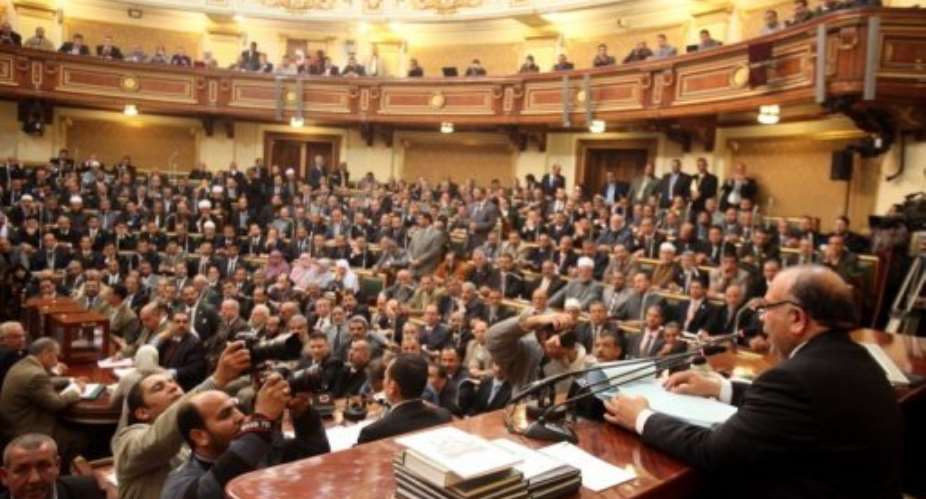CAIRO (AFP) - Egypt's Muslim Brotherhood, which already controls parliament, is now eyeing the presidency as it seeks to consolidate its newfound power, but the move risks backfiring, analysts say.
The Islamist movement announced on Saturday that it would nominate its deputy leader, Khairat al-Shater -- a business tycoon and the group's main financier-- to run for the country's top job.
The announcement sent shockwaves through political circles, just two months before the first presidential elections since a popular uprising toppled Hosni Mubarak last year. The election kicks off on May 23.
"The Brotherhood is trying to take all the tools in the country, it is not surprising that they field a candidate," said Mustafa Kamel al-Sayyed, a professor of political science at Cairo University.
"Since they won the parliamentary elections, one can expect them to make the same effort for the presidency and that their candidate stands a good chance of making it to the second round," he told AFP.
But for political analyst Hassan Nafea, the battle will be tough for the Brotherhood, whose intentions to consolidate power can prove "very dangerous and lead to a polarisation."
For months, the Muslim Brotherhood have said they would endorse a consensus candidate, compatible with their ideas but not affiliated to their group, in order to mitigate fears it was trying to monopolise power.
But their sudden U-turn and the decision to nominate Shater sparked heated arguments within the organisation, even before the public announcement.
Shater has been jailed several times, most recently in 2006 when a military court sentenced him to seven years for terrorism and money laundering, after his assets were frozen.
He was released last March, just a month after Mubarak was toppled.
The Muslim Brotherhood's lawyer Abdel Moneim Abdel Maqsud told AFP that the military had rescinded Shater's conviction, which would have prevented him from running.
"The procedure's were finished last week to drop the sentences against him," he said.
Shater's nomination comes at a critical time, with the drafting of the constitution boycotted by liberals and leftists who accuse the Islamists of monopolising the process.
The panel tasked with writing the country's new charter, whose members were elected by legislators, is made up of nearly 60 percent Islamists from the Brotherhood's Freedom and Justice Party (FJP) and the more conservative Salafist Al-Nur party.
The Brotherhood has defended its decision to field one of its members, pointing to its frustration of seeing its efforts to have the current government sacked and replaced by an FJP-led cabinet ignored by the ruling military.
The current prime minister, Kamal al-Ganzuri, was minister under Mubarak and is accused by the Islamists of stalling the revolution.
"There is a real threat to the revolution and to the democratic process," said the Brotherhood's secretary general, Mahmud Hussein, at a news conference on Saturday, adding that some of the presidential hopefuls were members of the old regime.
Among them is former Arab League chief and ex-foreign minister Amr Mussa, as well as Ahmed Shafiq, the last prime minister under Mubarak.
According to media reports, former intelligence chief Omar Suleiman will also be vying for the presidency.
Other Islamist candidates have already registered their candidacy, including former Brotherhood member Abdel Moneim Abul Fotouh, and Salafist candidate Hazem Abu Ismail whose active campaign risks stealing from the Brotherhood's limelight.
"By fielding a candidate despite promising not to do so, the Brotherhood find themselves in a difficult position," Nafea said.
"The revolution was not just about police brutality, it was also against the monopoly of the business elite," said Rabab al-Mahdi, a professor of political science at the American University in Cairo.
With Shater being a top organisational leader and also the movement's main financier, "the Muslim Brotherhood are making the same mistakes as the National Democratic Party," Mubarak's old party, Mahdi told AFP.
The Brotherhood "have a strong political machine but they have exhausted all their chances for a consensus candidate. Khairat al-Shater is their last resort," she said.





 We’ll no longer tolerate your empty, unwarranted attacks – TUC blasts Prof Adei
We’ll no longer tolerate your empty, unwarranted attacks – TUC blasts Prof Adei
 Bawumia donates GHc200,000 to support Madina fire victims
Bawumia donates GHc200,000 to support Madina fire victims
 IMF to disburse US$360million third tranche to Ghana without creditors MoU
IMF to disburse US$360million third tranche to Ghana without creditors MoU
 Truck owner share insights into train collision incident
Truck owner share insights into train collision incident
 Paramount chief of Bassare Traditional Area passes on
Paramount chief of Bassare Traditional Area passes on
 Two teachers in court over alleged illegal possession of BECE papers
Two teachers in court over alleged illegal possession of BECE papers
 Sunyani: Victim allegedly shot by traditional warriors appeals for justice
Sunyani: Victim allegedly shot by traditional warriors appeals for justice
 Mahama vows to scrap teacher licensure exams, review Free SHS policy
Mahama vows to scrap teacher licensure exams, review Free SHS policy
 Government will replace burnt Madina shops with a new three-story, 120-store fac...
Government will replace burnt Madina shops with a new three-story, 120-store fac...
